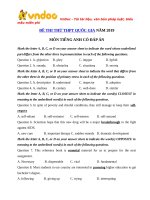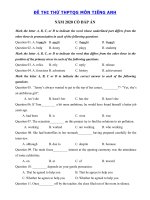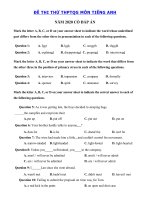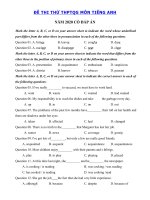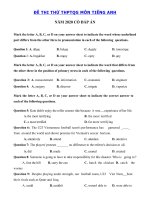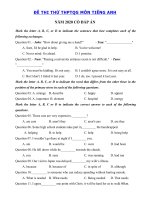De thi thu thpt quoc gia 2022 mon anh co mai phuong
Bạn đang xem bản rút gọn của tài liệu. Xem và tải ngay bản đầy đủ của tài liệu tại đây (106.58 KB, 13 trang )
<span class="text_page_counter">Trang 1</span><div class="page_container" data-page="1">
<b>Mark the letter A, B, C, or D on your answer sheet to indicate the correct answer to each ofthe following Questions. </b>
<b><small>Question</small></b> 1. _______ money I earn, the happier I am.
</div><span class="text_page_counter">Trang 2</span><div class="page_container" data-page="2">C. Has been travelled D. Have been travelling
<b><small>Question</small></b> 7. ________, she will hold a party to celebrate. A. When her son passes the exam
B. Once her son passed the exam C. While her son was passing the exam D. After her son had passed the exam
<b><small>Question</small></b> 8. Ha Long Bay is famous for its beauty, so it attracts thousands of _____ every year.
</div><span class="text_page_counter">Trang 3</span><div class="page_container" data-page="3">D. is attending
<b><small>Question</small></b> 10. Mary is looking for the _______ vase she got as a birthday gift last year. A. clay nice black
B. black clay nice C. nice black clay D. nice clay black
<b><small>Question</small></b> 11. The principal’s speech was so long and boring that many students ________.
</div><span class="text_page_counter">Trang 4</span><div class="page_container" data-page="4"><b>Mark the letter A, B, C, or D on your answer sheet to indicate the most suitable response tocomplete each of the following exchanges. </b>
<b><small>Question</small></b> 16. Lucy is talking to Hannah at her birthday party. - Lucy: “Thank you for your lovely sweater.”
- Hannah: “___________” A. Thanks for looking for it. B. Here you are.
C. I’m glad you like it. D. Same to you.
<b><small>Question</small></b> 17. Jennifer and Luke are at the bookstore. - Jennifer: “How about buying this book for David?”
</div><span class="text_page_counter">Trang 5</span><div class="page_container" data-page="5"><b>Mark the letter A, B, C, or D on your answer sheet to indicate the word that differs from the other three in the position of the primary stress in each of the following Questions. </b>
<b>Mark the letter A, B, C, or D on your answer sheet to indicate the word whose underlined part differs from the other three in pronunciation in each of the following Questions. </b>
<b>Mark the letter A, B, C, or D on your answer sheet to indicate the word(s) CLOSEST in meaning to the underlined bold word(s) in each of the following Questions. </b>
<b><small>Question</small> 22. This event will be a good opportunity to build relationships with potential </b>
</div><span class="text_page_counter">Trang 6</span><div class="page_container" data-page="6"><b>Mark the letter A, B, C, or D on your answer sheet to indicate the word(s) OPPOSITE in meaning to the underlined word(s) in each of the following Questions. </b>
<b><small>Question</small> 24. The article was very confusing, so he had to read it twice to understand what the </b>
<b>Mark the letter A, B, C, or D on your answer sheet to indicate the sentence that best combines each pair of sentences in the following Questions. </b>
<b><small>Question</small></b> 26. These products have affordable prices. They can have a negative effect on the environment.
A. But for their reasonable prices, these products could have a negative effect on the environment.
B. Inexpensive as these products are, they can have a negative effect on the environment. C. It is the affordable prices of the products that can have a negative effect on the environment. D. So negatively do these products affect the environment that their prices are cheap.
<b><small>Question</small></b> 27. He wants to go to the concert with his friends. He feels unwell. A. Unless he feels unwell, he can go to the concert with his friends.
B. If only he hadn’t felt unwell, he could have gone to the concert with his friends. C. Provided that he feels unwell, he can’t go to the concert with his friends.
D. He wishes he felt better so that he could go to the concert with his friends.
<b>Mark the letter A, B, C, or D on your answer sheet to indicate the sentence that is closest inmeaning to each of the following Questions. </b>
<b><small>Question</small></b> 28. Nam has been reading this book for three months.
</div><span class="text_page_counter">Trang 7</span><div class="page_container" data-page="7">A. Nam has three months to read this book. B. Nam last read this book three months ago. C. Nam began reading this book three months ago. D. Nam didn’t read this book three months ago.
<b><small>Question</small></b> 29. “I forgot to close the window last night,” Martin said. A. Martin said that he would forget to close the window the night before. B. Martin said that he had forgotten to close the window the night before. C. Martin said that he was forgetting to close the window the night before. D. Martin said that he has forgotten to close the window the night before.
<b><small>Question</small></b> 30. Passengers are permitted to bring their personal items onboard. A. Passengers shouldn’t bring their personal items onboard.
B. Passengers would bring their personal items onboard. C. Passengers mustn’t bring their personal items onboard. D. Passengers can bring their personal items onboard.
<b>Mark the letter A, B, C, or D on your answer sheet to indicate the underlined part that needs correction in each of the following Questions. </b>
<b><small>Question</small></b> 31. Two students were chosen for the project because of his excellent knowledge of art.
</div><span class="text_page_counter">Trang 8</span><div class="page_container" data-page="8">C. during D. in
<b><small>Question</small></b> 33. Parents expressed their considerable concerns when the school was negligible in allowing the children to go inside the dark and cold cave.
A. expressed B. considerable C. negligible D. cold
<b>Read the following passage and mark the letter A, B, C, or D on your answer sheet to choose the word or phrase that best fits each of the numbered blanks from 34 to 38. </b>
MOBILE PHONES AND LEARNING
Mobile phones are everywhere these days. We all take our smartphones for granted, and this is especially true for teenagers. But what about using phones at school? (34) ______ teachers would prefer it if students left their phones at home. (35) ______, most students would rather not do this, and they use them when the teacher isn’t looking. What if schools relaxed their rules and allowed students to use mobile phones productively in class? For example, the phone’s calendar
function can be used to keep (36) ______ of homework and the camera to take pictures of notes on the board. Mobile phones give students access to tools and apps that can help them develop
time management and organization skills.
Nevertheless, concerns have been voiced about classroom discipline, cyber-bullying and cheating, (37) ______ have become a troublesome part of school life. These issues are clear evidence that schools had better teach students how to use technology (38) ______. So, teachers who decide to use mobile phones as part of their classes need to keep an eye on how they are being used. After all, they can only be good classroom tools if used appropriately.
<i>(Adapted from Oxford Exam Trainer by Helen Weale)</i>
</div><span class="text_page_counter">Trang 9</span><div class="page_container" data-page="9"><b>Read the following passage and mark the letter A, B, C, or D on your answer sheet to indicate the correct answer to each of the Questions from 39 to 42. </b>
Before you go to an interview, think about your appearance. When you make your choice of clothes, avoid anything too casual but don’t go to the other extreme of wearing items that are so formal you feel uncomfortable in them.
Make sure you know the exact location of the building where the interview will take place. There’s nothing worse than desperately trying to find the right place as the time for it to begin rapidly approaches. Once you reach the firm’s offices, remember that the interview starts there. You never know who you might meet in lifts, corridors or waiting rooms, so try to make a good impression on everyone.
When you go into the interview room, show you have confidence in yourself, and strike an appropriate balance between formality and friendliness. Bear in mind that people tend to make a judgement about someone they have met within a few minutes.
<i>(Adapted from First Trainer by Peter May)</i>
<b><small>Question</small></b> 39. What is the passage mainly about? A. Things you should do after an interview B. Some advice on preparing for an interview C. Things you shouldn’t do during an interview
</div><span class="text_page_counter">Trang 10</span><div class="page_container" data-page="10">D. Some useful tips on how to send your CV
<b><small>Question</small></b> 40. The word them in paragraph 1 refers to ______. A. choices
B. buildings C. items D. interviews
<b><small>Question</small></b> 41. According to paragraph 2, it’s a good idea for you to ______. A. ask for directions
B. be on time
C. create a good impression on others
D. use lifts or corridors to the interview room
<b><small>Question</small></b> 42. The word appropriate in paragraph 3 is closest in meaning to _______. A. terrible
B. strange C. strong D. suitable
<b><small>Question</small></b> 43. As stated in paragraph 3, when you are in the interview room, you should ______. A. show all your emotions
B. judge other people in the same room C. be friendly to everyone all the time D. express your confidence
<b>Read the following passage and mark the letter A, B, C, or D on your answer sheet to indicate the correct answer to each of the Questions from 44 to 50. </b>
</div><span class="text_page_counter">Trang 11</span><div class="page_container" data-page="11">Wagner Iworrigan, a seventeen-year-old high school senior on St. Lawrence Island in Alaska, knows a lot about biology, meteorology and maths. On a recent unseasonably warm day last autumn, he missed class to join his uncle on their boat. Wagner might make a good scientist, but he’s not planning on going to college. He feels a responsibility for his siblings - his mother died
<b>and his father lives in another village - and college is ‘so far from home’. He’s also unclear </b>
about what he would do with a degree.
<b>Many St. Lawrence students say they want to go to college but half of them drop out of high </b>
school, and only two per cent graduate from college. The benefits of a degree are not obvious for people living on this remote island. Families have a subsistence lifestyle, hunting walruses, seals and whales in the spring, and gathering berries in the summer. The largest employer is the school system; otherwise, there are only a handful of jobs in fishing, oil and the airlines that connect the island to the mainland. There isn’t much demand for anything else and more than a quarter of adults are unemployed.
Many people feel that the educational programs are too stifling, not allowing students to go beyond the curriculum, with little connection to the real world. ‘We want our children to achieve academically, but we need to be able to design programs that deal with the challenges they face day-to-day,’ said one teacher. Those challenges are profound with no easy solutions. Families
<b>also worry that sending children away to study in Higher Education could endanger the </b>
language and culture. Already, the younger generation is losing its fluency and grasp of skills like sewing, walrus-ivory carving and fish-cutting. Respect for the old ways and knowledge of traditions are disappearing. Can the community send more students to university without sacrificing its desire to preserve Native culture and language?
Unsurprisingly, locals are protective of their independence and their heritage. They recognize the value of ‘education’, but feel that the definition is too narrow. ‘I think about when my
grandmother taught me to cut fish, remembers one resident. ‘It wasn't do it once and I'll give you a grade. It was hours of practice until you get it right …’
<i>(Adapted from Insight by Jayne Wildman and Fiona Beddall)</i>
<b><small>Question</small></b> 44. Which best serves as the title for the passage? A. Education at School in Times of Change
B. What’s the Point of Going to College? C. Growing Interests in Education at School D. Dropping out of School – a Prevalent Trend
<b><small>Question</small></b> 45. The word unclear in paragraph 1 can be best replaced by _______. A. disloyal
</div><span class="text_page_counter">Trang 12</span><div class="page_container" data-page="12">B. uninterested C. disappointed D. uncertain
<b><small>Question</small></b> 46. According to paragraph 1, Wagner isn’t going to college because ______. A. he is busy going fishing with a relative
B. he’s already good at science subjects C. he has to look after his brothers and sisters D. he doesn’t mind living without a degree
<b><small>Question</small></b> 47. The word them in paragraph 2 refers to _______.
<b><small>Question</small></b> 49. Which of the following is NOT true, according to the passage? A. People on the island are aware of the advantages of having a college degree. B. Young people on St. Lawrence Island are losing the skills to do traditional jobs. C. Local people are worried about youngsters forgetting their traditions.
D. People on St. Lawrence Island find it quite hard to get a job.
</div><span class="text_page_counter">Trang 13</span><div class="page_container" data-page="13"><b><small>Question</small></b> 50. Which of the following can be inferred from the passage?
A. The Native culture and language will certainly go extinct at one time in the future. B. Everyone on St. Lawrence Island is doubtful of the idea of higher education. C. There is a need for the school curriculum to be relevant to children’s daily life. D. The idea of education is comparable to schooling in many surprising ways.
</div>